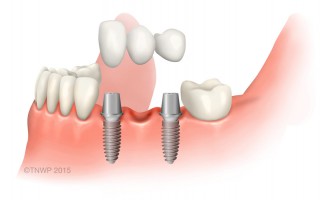Can implants help if I am missing several teeth?
Dental implants offer a strong, stable and long-lasting solution for people with missing tooth roots. They are considered the ‘gold standard’ to replace missing teeth because they are the only treatment available to replace both the lost natural tooth and its root. Titanium supports hold replacement teeth such as single crowns, multiple-tooth bridges and even full dentures.
 If you have a gap where several teeth are missing, your dentist may offer you multiple implants with individual crowns, or a permanent implant-supported fixed bridge. An implant-supported bridge provides several advantages over other teeth replacement options:
If you have a gap where several teeth are missing, your dentist may offer you multiple implants with individual crowns, or a permanent implant-supported fixed bridge. An implant-supported bridge provides several advantages over other teeth replacement options:
- Looks, feels and functions like natural teeth
- Fixed in place, so no need to remove to clean
- Supported by implants, so adjacent healthy teeth are not shaved down and damaged
- Able to eat all your favourite foods without hesitation
- Shrinkage of underlying bone can be prevented because implants will replace some of your teeth roots
- Should last a lifetime with good oral hygiene and professional maintenance
What are the alternative to an implant-supported bridge?
Other common treatments for the loss of several teeth are replacement tooth-supported bridges and removable partial dentures. These options do not involve dental implant treatment and are dependent on support from adjacent teeth.
Tooth-supported bridge
A tooth-supported bridge requires the teeth either side of the gap to be shaved down with a drill, so that the bridge can be fitted on top of them. This damages the teeth and can reduce their lifespan, often leading to further complications. The additional chewing stress on these supporting teeth also puts them at risk. Additionally, the bone underneath the bridge can shrink and deteriorate due to lack of use, leading to sunken cheeks and lips. This process is known as bone resorption.
Removable partial denture
A removable partial denture uses clasps to grip adjacent teeth which hold the denture in place. The clasps put pressure on the teeth and gums supporting the denture, which can weaken the jawbone and loosen the supporting teeth. This can lead to further tooth loss. As the partial denture does not replace the root, the bone and gum beneath the denture can shrink because it is not being stimulated. The chewing pressure on the gums from the force of the denture can also reduce blood supply, increasing the rate of deterioration. Partial dentures can be loose and uncomfortable. They can move around in your mouth, reducing your ability to eat a certain diet. Food can get trapped beneath the plate while eating.
Should I just leave a gap?
It is easy to think that losing a few teeth won’t cause you any problems. But unfortunately the long-term consequences of tooth loss can be quite serious. Missing teeth can be unsightly, result in difficulty eating and speaking, and can change the shape of your face. Bone and gum left in a gap will shrink (resorb) because of underuse.
Dental implants help preserve bone
Dental implants are inserted into the jaw and usually left to fuse with the jaw bone before replacement teeth are fitted. This process is called ossseointegration. It produces a secure bond between the tooth and the surrounding bone. Once implants are in place they are the only dental treatment option that actually preserves bone and stimulates bone growth, preventing shrinkage and loss.
Dental implants also help to prevent a condition called malocclusion, which results in teeth adjacent to a gap moving and drifting into the space. This can impact the way you chew and affect the surrounding muscles and joints, which can lead to symptoms such as headaches. It can also make these teeth harder to clean, which could increase risk of decay and gum disease. Leaving a gap can also lead to the opposing tooth protruding into the missing space, which is known as overeruption. Dental implants can prevent your teeth from shifting into an empty space, and help to provide a solid structure to maintain your bite and reduce the stress on your remaining natural teeth.
Dental implant treatment is tailored to the individual. It will depend on the number of teeth you have lost, where teeth are missing and your overall health. Your dentist will help decide which option suits you.
To find out if you could benefit from tooth implants, book a free initial consultation with an implant dentist today.
